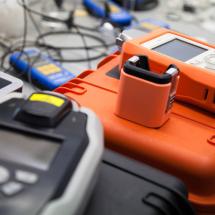
|
Measurement and Signal Processing in Chemistry
Doctoral Programme,
Faculty of Chemical Engineering
The study programme is focused on modern sensor technology, chemical sensors, modeling, simulation, identification and classification (bio) chemical processes, data collection and processing from chemical, biochemical and biological samples. The theoretical basis of the programme is the principles of the function sensors of physical and chemical quantities, methods of digital signal processing and selected chapters from applied mathematics. The aim of the study of this programme is to educate a doctoral student for independent scientific work in the areas of (i) modern chemical sensors, (ii) modeling, simulation and analysis of complex chemical processes and (iii) modern methods of data processing primarily from chemical, biochemical and biological samples. The aim is to equip students with advanced theoretical knowledge and practical skills and to educate independent scientific personalities from them, able to further develop the areas of theoretical and applied research. CareersThe graduate is multidisciplinary and has in-depth knowledge of various branches of measuring and sensor technology, modeling of chemical processes, signal collection and processing. Has an overview of topics related to: (i) construction and principles of operation of sensors and measuring systems and (ii) mathematical and statistical methods in signal and image processing. He is led to the ability to work independently and in a team, the formulation of a scientific problem, the creation of a concept for its solution and the implementation of research in all phases of this process. The graduate will be ready to design their own research or industrial projects. He will acquire knowledge and skills that will enable him to adapt professionally in specific conditions in the field of basic and applied research, in the academic sphere and in technological practice connected especially with the chemical and food industry. Programme Details
Ph.D. topics for study year 2026/27Elaboration of environmentally benign composites for shielding of electromagnetic interference
AnnotationThe project deals with design of environmentally benign composites in form of flexible free-standing films or aerogels for electromagnetic interference (EMI) shielding application. The composites will be prepared from bio-sourced cellulose fillers and efficient receptors of EMI (e.g. supramolecular conducting polymers, carbon nanotubes, graphene, metal organic frameworks, recycled carbon, etc.). Novel approaches of matrix/receptor compatibilization will be designed. In addition, fundamental aspects governing the behavior of the composites will be studied to understand the interactions occurring between the phases of the composites and the structure-properties relationships. Thorough experiments in the DC and AC electrical field on the composites and their components will be performed to reveal patterns driving the resulting shielding efficiency. Finally, the synergetic effect of both receptors leading to the controllable EMI shielding efficiency by absorption or reflection will be studied. |
You are here: UCT Prague → Web PhD → Prospective doctoral candidates → Study Programmes and PhD Topics → Programme detail
Updated: 20.1.2022 16:26, Author: Jan Kříž

